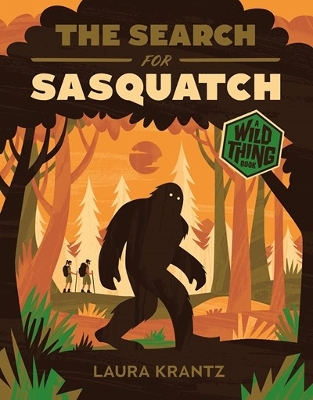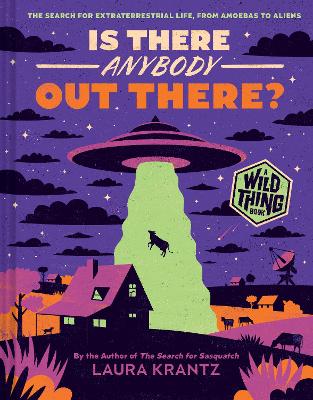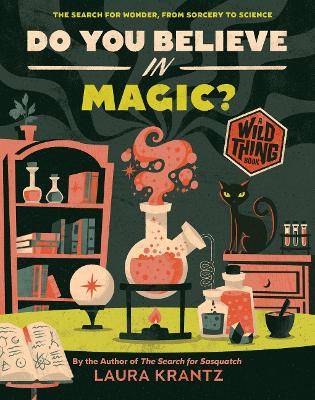Wild Thing
3 total works
Inspired by her popular Wild Thing podcast, journalist Laura Krantz incorporates the scientific method and her journalistic skills to determine if Bigfoot is realWhen journalist Laura Krantz discovered that her long-lost cousin, Grover Krantz, a distinguished anthropologist and professor at Washington State University, had devoted much of his career to the search for Bigfoot, she couldn’t quite believe it. A natural skeptic and a strong believer in facts, Krantz decided to conduct her own quest for the most famous and elusive mythical creature. The Search for Sasquatch takes readers through the big guy’s fun, fascinating, and complex world, posing the question: Could Bigfoot be out there? Exploring the gray area between myth and science, Krantz takes readers on a strange, surreal, and surprising hunt for the fabled Sasquatch—showing us how to challenge our gut assumptions and open our minds to new possibilities, to think critically, and to use the scientific method along the way. The Search for Sasquatch asks readers to evaluate the evidence it presents and make up their own minds, all while considering why Bigfoot might be important—even if we don’t find him.
Inspired by her popular Wild Thing podcast, journalist Laura Krantz incorporates the scientific method and her journalistic skills to determine if aliens might existHow likely is it that humans aren’t alone in the universe?Reports of strange lights, UFO sightings, and alien encounters abound—and some (like recent accounts from US Navy pilots) even sound credible. And in recent years, armed with state-of-the-art technology and better information, the search for extraterrestrials overflows with exciting possibilities. Within our own solar system, astrobiologists search for the biochemical building blocks that might sustain microbes, astronomers discover far-flung stars, orbited by planets that could be teeming with life, and astrophysicists point sophisticated telescopes toward the deep reaches of the universe, looking for anything out of the ordinary.Is There Anybody Out There? turns our collective gaze skyward: What’s the likelihood of life on other planets? Or that aliens have already made the trip to visit us? How would they get here? Why do we want to find them? And what does it mean if we do (or don’t)? Teaching readers to challenge their gut assumptions and open their minds to new possibilities, using critical thinking and the scientific method, journalist Laura Krantz investigates the science, culture, and philosophy of a universe where we’re not alone—and why the idea of alien life has abducted our imaginations.
Inspired by her popular Wild Thing podcast, journalist Laura Krantz incorporates the scientific method and her journalistic skills to determine if magic might be real in Do You Believe in Magic?
Magic—spells and curses, hexes and potions, superstition, and rituals. We’ve all heard stories of alchemists attempting to turn abundant lead into precious, rare gold. Or of poor, unfortunate souls asking potion masters to brew up unappetizing concoctions that will help them find love. And of course, we’re familiar with curses—muttering magical words for the purposes of exacting revenge on an enemy, or protecting a hidden treasure.
Who wouldn’t like the idea of special powers, or control over the natural world? It seems pretty fun, even if it’s just the stuff of fantasy books and movies. But a lot of what we call “magic” has grounding in real practices. In fact, magic is at the root of many scientific fields—from chemistry to botany to astronomy—and has been an important part of human culture for thousands of years.
Do You Believe in Magic? takes readers through a world where magic and science collide. What do they have in common? Where do they differ? What role has magic played in our history, and the history of science? Why is magic still significant, even when it doesn’t seem to line up with reality? And is it possible to be scientifically minded and still believe in magic? Readers are encouraged to weigh the facts and go beyond their gut assumptions, to stretch their imaginations and think about why magic and science might be two sides of the same coin.
Includes color illustrations, an at-home science/magic experiment, glossary, bibliography, and index
A Wild Thing series:
The Search for Sasquatch
Is There Anybody Out There?
Do You Believe in Magic?
Magic—spells and curses, hexes and potions, superstition, and rituals. We’ve all heard stories of alchemists attempting to turn abundant lead into precious, rare gold. Or of poor, unfortunate souls asking potion masters to brew up unappetizing concoctions that will help them find love. And of course, we’re familiar with curses—muttering magical words for the purposes of exacting revenge on an enemy, or protecting a hidden treasure.
Who wouldn’t like the idea of special powers, or control over the natural world? It seems pretty fun, even if it’s just the stuff of fantasy books and movies. But a lot of what we call “magic” has grounding in real practices. In fact, magic is at the root of many scientific fields—from chemistry to botany to astronomy—and has been an important part of human culture for thousands of years.
Do You Believe in Magic? takes readers through a world where magic and science collide. What do they have in common? Where do they differ? What role has magic played in our history, and the history of science? Why is magic still significant, even when it doesn’t seem to line up with reality? And is it possible to be scientifically minded and still believe in magic? Readers are encouraged to weigh the facts and go beyond their gut assumptions, to stretch their imaginations and think about why magic and science might be two sides of the same coin.
Includes color illustrations, an at-home science/magic experiment, glossary, bibliography, and index
A Wild Thing series:
The Search for Sasquatch
Is There Anybody Out There?
Do You Believe in Magic?


